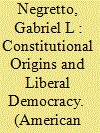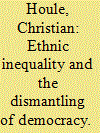| Srl | Item |
| 1 |
ID:
152228


|
|
|
|
|
| Summary/Abstract |
Does the enumeration of ethnic, racial, and/or religious categories on national household censuses increase the likelihood of conflict? The authors propose a theory of intergroup relations that emphasizes the conflictual effects of institutionalizing boundaries between social identity groups. The article investigates the relationship between counting and various forms of conflict with an original, global data set that classifies the type of enumeration used in more than one thousand census questionnaires in more than 150 countries spanning more than two centuries. Through a series of cross-national statistical analyses, the authors find a robust association between enumeration of ethnic cleavages on the census and various forms of competition and conflict, including violent ethnic civil war. The plausibility of the theory is further demonstrated through case study analysis of religious conflict in India.
|
|
|
|
|
|
|
|
|
|
|
|
|
|
|
|
| 2 |
ID:
178996


|
|
|
|
|
| Summary/Abstract |
A strong tradition in democratic theory claims that only constitutions made with direct popular involvement can establish or deepen democracy. Against this view, we argue that new constitutions are likely to enhance liberal democracy when they emerge through a plural agreement among political elites with distinct bases of social support. Power dispersion during constitution writing induces the adoption of institutions that protect opposition forces from the arbitrary use of executive power without unduly impairing majority rule. However, since incumbents may renege on the bargain, the democratizing effect of politically plural constitutional agreements is likely to be larger in the short term, when the identity of negotiating political forces and the balance of power between them tend to remain stable. We find support for these arguments using an original global dataset on the origins of constitutions between 1900 and 2015 and a difference-in-differences design.
|
|
|
|
|
|
|
|
|
|
|
|
|
|
|
|
| 3 |
ID:
139921


|
|
|
|
|
| Summary/Abstract |
Does inequality between ethnic groups destabilize democracies? While the literature largely agrees that inequality harms democracies, previous studies typically focus on the overall level of inequality in a society, leaving unanswered questions about the effect of inequality between ethnic groups. This article fills this gap and argues that inequality between ethnic groups harms the consolidation of democracy but that its effect is strongest when inequality within groups is low. Using group- and country-level data from more than seventy-one democracies and 241 ethnic groups worldwide, the author conducts the first cross-national test to date of the effect of ethnic inequality on transitions away from democracy. Results provide support for the hypothesis: when within-ethnic-group inequality (WGI) is low, between-ethnic-group inequality (BGI) harms democracy, but when WGI is high, BGI has no discernable effect.
|
|
|
|
|
|
|
|
|
|
|
|
|
|
|
|
| 4 |
ID:
129487


|
|
|
|
|
| Publication |
2014.
|
| Summary/Abstract |
This paper is the first global investigation of the relationship between remittances and terrorism. To discern this relationship, we draw terrorism event data from the Global Terrorism Database and International Terrorism: Attributes of Terrorism Events. When a host of standard terrorism controls is employed, lagged remittances as a share of gross domestic product have a positive and significant impact on both domestic and transnational terrorist attacks. For the venue country's viewpoint, lagged remittances have a greater marginal impact on domestic than on transnational terrorism. However, when we investigate remittances to the home country of the perpetrator, lagged remittances have the greatest marginal impact on transnational terrorism. Throughout our investigation, standard terrorism controls perform according to our priors and those of the literature, lending credence to the isolation of the impact of remittances. We also account for endogeneity concerns.
|
|
|
|
|
|
|
|
|
|
|
|
|
|
|
|